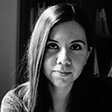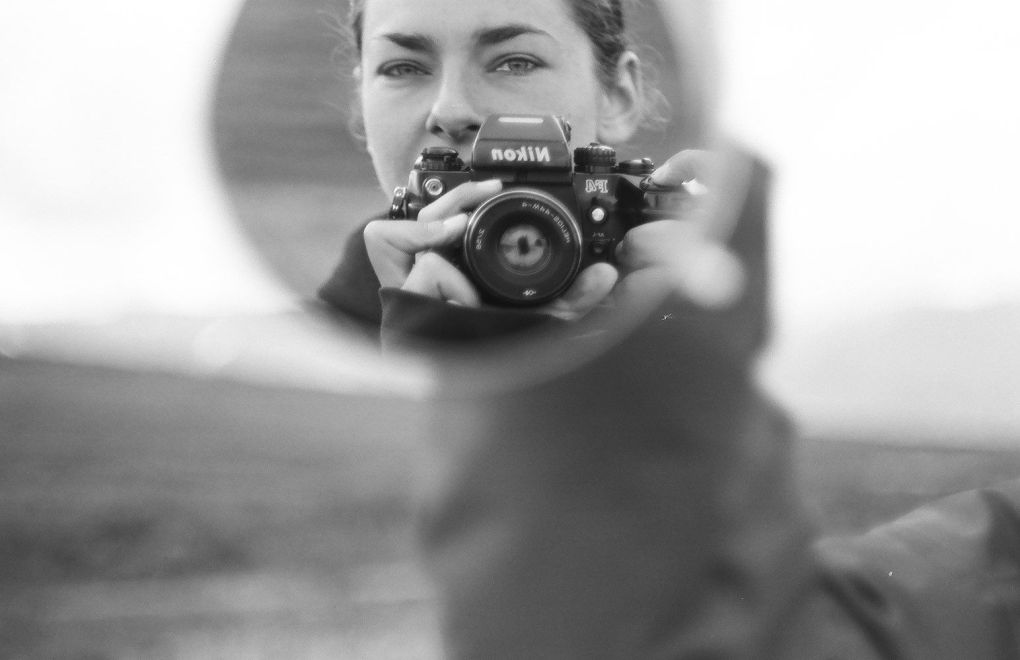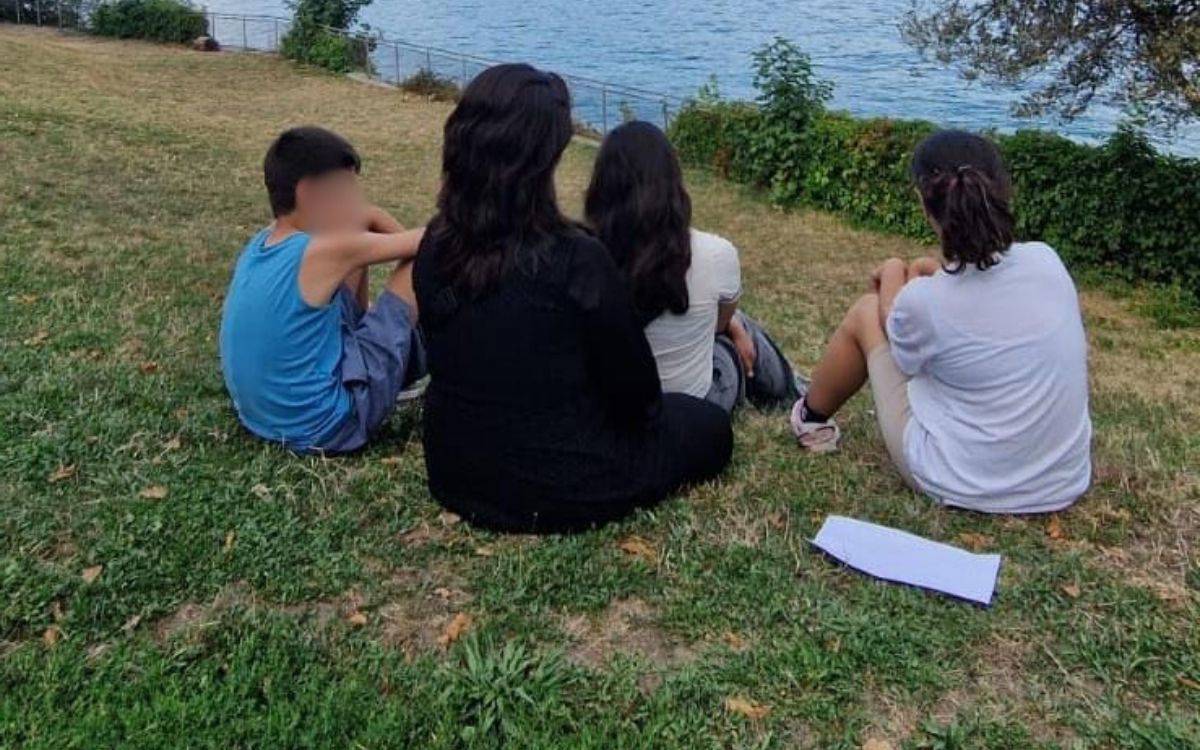Click to read the article in Turkish
"There are different ways of fighting for your rights, I believe, and we all have these powerful tools of social media, we have just seen these Instagram campaigns... I believe that life and arts have this huge potential of making work that is politically inspiring and challenging and I hope that, in some way, initiating this project, doing these walks with women and finally creating this map and audios will provoke someone else to think about this and will hopefully be important as putting those names and experience on the map.
"I do see that it is one of the stones that we are putting together all there in the foundation of something new. So, I think that my call out is there: Walk me home, come and walk with me..."
It is performance artist Alisa Oleva from London who makes the above call to women "to walk her home, to come and walk with her" in İstanbul.
Oleva is the first artist nominated to the "Artistic Development Programme'' as part of Performistanbul's artist residency focused on performance artists. She is now looking for women and individuals who self-define as women. For walking "home" together with Oleva, the final participation date for applications is on October 25, 2020.
At the performance entitled Walking Home, while the participants will be walking towards the place where they describe as "home" in İstanbul, the artist will accompany each partner within one-to-one sessions from London by connecting via phones without the presence of an audience.
In order to designate the starting point of the walking, a map that reads the city through the locations of historical and forensic figures, artefacts and events related to women will guide the participants.
In these traces there are such as; the Sultanahmet Square in the remembrance of Halide Edip Adıvar's activist and political speech in 1919, Yıldız Park in memory of Gürdal Duyar's sculpture that represents Istanbul in the form of a woman's body, Fındıklı park where Füsun Onur's 50thyear sculpture that got removed by the city hall crew during the organisation as well as selected places such as Süreyya Opera.
Alisa Oleva has spoken to bianet about the details of the project:
'Where is the safe sensation, at home or on streets?'
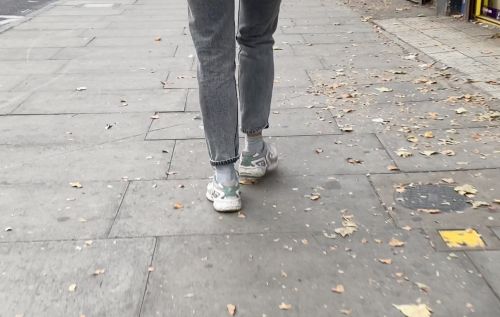
What is the starting point of this project? Where did you think of it?
This idea came as a direct response to the open call which I saw at the website. I was immediately really interested in it; first of all, because it was called the research residency. So, for me as an artist, it was interesting to be challenged and to be learning as well as making work.
Also, I was extremely intrigued to go to İstanbul as I have never been there to explore its context and relate to it. But, unfortunately, it did not happen. I have never been in İstanbul and I do not know when I will be.
Another word in the open call was home and the response to it. So, that was the framework in which the idea was born. I think it was also influenced by the small gif that Performistanbul has on its website. When you just enter the website, you see these two feet walking.
As a walking artist, I immediately related and I felt like the shared footstep would be the main element for me in this work. That was how the idea of walking home came about.
In Turkey - and probably as in different countries - they are the places where most women see domestic violence. In this sense, women may not feel safe at home. Is there a reference to this or an attribution in your project?
Yes, there is definitely an awareness of that and this is precisely why I am interested in the idea of home and whether that home is sometimes not where we actually live. It may not be in the place where we live.
Our sensation, our feeling of home might sit somewhere else. So, for me, it was important to raise that question and to challenge and to encourage to think what makes one feel at home and what home really is.
As the pandemic started, it actually added even more importance to that question because we were now even more stuck at home and, as we know, the cases of domestic violence have gone up during the lockdown.
This idea of being stuck at home as well and of having to be at home... This is also why it was for me important to not just meet at a place or location where it feels like home for the participant, but to walk home because that walking takes it into the public space.
If we think of home as something private or as something that we personally and intimately relate to, walking is, in this case, happening in the public space of the city. And how do those two sit together?
Where is the safe sensation? Because it could be that you are feeling safer when walking on the streets than you are when you are at home. Or is it the opposite? Is it walking that is unsafe and you only feel safe when you are entering the space that you call home?
So, I am really interested in the idea of safe and unsafe, what makes one feel safe in a certain place and what the elements of that are.
'Places with sensations of home put on the map'
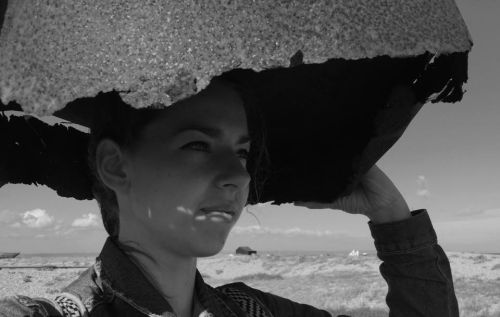
Alisa Oleva
You have determined the important points of İstanbul as a walking area. What were your criteria in this sense?
Well, this was done with the help of the Performistanbul team and this is where the research part is also coming in, of me learning and relying on the knowledge of the locals...
But the whole idea of putting dots, of choosing the starting points for the participants as these important places on the map for the women history and women presence in the public space of İstanbul did come during the project as it was feeling like one more layer and one more extension of putting onto maps, of inscribing onto maps these places of importance for women in the city and which have connection to women in the city.
So, while me and participants are walking in İstanbul, putting these personal places onto the map, these places of personal importance and sensations of home, it is also important that it is adding to the historical map of the places where women's imprint has already happened, where there are certain names, things named after women or monuments to women.
We felt it important to widen the map and to be putting those immediate and personal places on the maps with the participants as well as highlighting those important places on the map which have already existed, highlighting important points that have already existed, to highlight and point out the importance of women presence, inscribing that presence, not allowing it to be invisible or unwritten into the map.
'I invite women in İstanbul to walk with me'
You are looking for women and participants who define themselves as women in İstanbul who will walk with you. Why not men?
There are various answers to that, one of them being that it was the framework of the initial open call. But, even if not that... For me, it was really important -also myself as a woman walking in the city, walking, in my case, in London- I am always aware of how that experience is different. It is still different. Of course, İstanbul and London are different contexts.
But I am very aware of how different it is for me to walk in the city, to walk in the city at night, to be walking home, to be walking on my own.
So, for me, it was important to limit it to women walking home precisely because of those differences that do exist and to highlight them, to voice them, to have an opportunity for voicing those differences of a lot of traditional thinking and linking in our European context. For example, linking women to the private space, most of the time, and not allowing the outside space, the city space, the urban space being more of a male space, men going out and coming back home... So, it was important for me to challenge that and to also give agency to women, to give agency to their voices.
That is why, I invite women to walk in İstanbul. For me, this map and the documentation which come out of this will be important in putting those walks into the fabric of the city and allowing those women experiences and voices to be inscribed in the city fabric.
'Women in Turkey claim their rights'

Can you describe your project as a feminist project?
I am not a big fan of classifying things. I think that "feminist" is a useful word, but it also limits things. So, there is a feminist aspect to this work and I think I would rather call it an important project for putting women voices out there, asking, discussing and having conversations, having the walks and putting those places on the map and those experiences on the map.
So, it has this importance and intention of not silencing and not ignoring, not ignoring the difference and talking about how different it is the experience of a woman in the city and her experience of home is.
I think with the current political situation and current struggles that women are facing in Turkey and how they are going out, they are in the streets. In the photos that you see in the protests, it is a very physical claiming of rights and claiming of space; it is presence, which is important. It is these bodies which go out and these women who go out. They are physically present to say that they do not agree, that they do want change.
I am a big believer that there is an important way of changing things by being physically present somewhere, by putting your body out there, saying, "I am here, I want that, I am saying this," instead of just being silent, probably even thinking those things, but not voicing them, not being out there in the streets, staying in. So, I believe that it is an important stage, it is an important moment in fighting for those rights.
For me, in this project, walking there is also about taking your body out there, taking yourself out there onto a walk, with each footstep, having a relationship with the space, having your presence in the space, imprinting yourself in the urban space of the city. So, in a way, if it helps, I could call this a feminist project.
'It is important to do it in İstanbul'
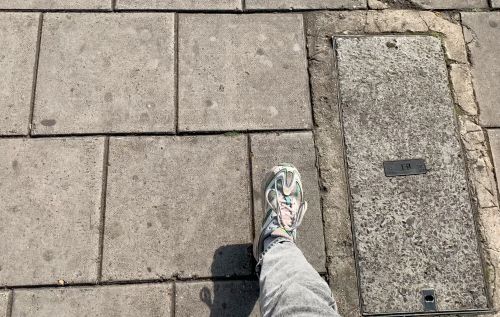
How do you describe your project?
That is a very broad question. I describe it as a walking project and I do work with walking as something that is very accessible and owned by everybody. We are all walking in the city in different ways. Some are probably not walking with their feet, but there are different ways of going from A to B and we do not even reflect on walking, it is part of our everyday life.
So, for me, to highlight the importance of walking, its political essential and its meditative qualities is really important.
I also describe it as a communal project; so, it is not just me coming to the place and making something there, making a certain work about the place. I am really interested in making work together with the local people, learning from them and sharing ownership of the work with them. This work is impossible without those women who agree to walk. If no one agrees, the work does not happen. So, for me, this mode of working as an invitation for conversation and I do think of each single woman as the co-creator of this project; I do not take full ownership of it.
So, this is another important element. I would describe this project as community-driven and with shared ownership.
I would also describe it as site-specific. So, it does not talk about something in general, it talks about very personal, very local experiences in certain contexts. This project would be different if I was walking with women in a different city. It would become site-specific to each city. So, for me, it is really important for me to make it in İstanbul.
It was precisely the context of the city and the situation with the women's rights there at the moment that inspired me to do this. So, I would call it a site-specific project that has been inspired and driven by this particular city and by this particular context.
I would also describe it as multimedia, I am using different media to make it. It is not a single tool that I am using; it is not just audio, it is not just map, it is not walking, it is not visual, it is not video... But, actually, it is all of it. So, it uses all different media inside it in order to create this sensation and to allow the audience to experience it in full.
'Woolf walked as a way of creating'
The bond that women establish with walking always seems different to me. Do you think?
Yes, I would agree with this. It is hard for me to know how it is to be a man, I can talk from my experience. But I can also talk from the history that we had different access to walking and different relationship to walking. There are a lot of aspects, political, social and economic aspects and status... Things that are involved in being able to walk...
When we talk about Virginia Woolf,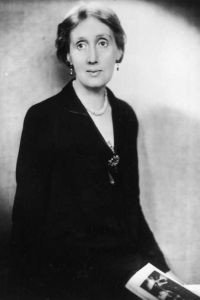 who is quite often associated with walking as a way of creating, a lot of her work was done when she was walking and thinking. We are also talking about class and access to walking. So, yes, it has all of this which cannot be ignored.
who is quite often associated with walking as a way of creating, a lot of her work was done when she was walking and thinking. We are also talking about class and access to walking. So, yes, it has all of this which cannot be ignored.
But, then, if we are just talking about walking in space... From my own experience of doing a lot of walk-shops and organizing walks with others, I do feel that it is experienced differently by women. Here is a metaphor that I would like to bring forward, which is a Nancy Shepherd book where she talks about walking in Scotland in the mountains.
It is specifically and very obviously different from a lot of the books written by men about hiking and walking in Scotland, where it is quite often about going on top, climbing and achieving something, marking and imprinting yourself on the space. For her, it is almost this endless walking around. So, there is no intention of necessarily going to the top, climbing or making a record.
It is more about just being there, treating all directions as equal and not necessarily having this intention of going up, which I think is quite often true for this different relationship: No need of claiming space, no need of conquering space, it is more wandering, a softer and more fluid relationship to space. I do think that it is true in a lot of ways that women establish different relationships with walking.
'A new type of work'
'Write me about your experience'
Finally, do you have a call to women in Turkey?
If what you mean by a call is a message, I think it would be a bit more interesting for me to answer this question once I have done the walks with women. I am starting in a week. The momentum has just been starting, I have only been working with Performistanbul and it has so far been more exposure, learning and researching as well.
My invite is already out there in the open call. My invitation is for them to take me home, to be walking home with me. My invitation is to allow oneself to think about those thingst to voice those things, to put yourself out there in the space, to be walking in that space and to be asking questions, to be challenging things and to keep going, keep finding ways.
There are different ways of fighting for your rights, I believe, and we all have these powerful tools of social media, we have just seen these Instagram campaigns... I believe that life and arts have this huge potential of making work that is politically inspiring and challenging and I hope that, in some way, initiating this project, doing these walks with women and finally creating this map and audios will provoke someone else to think about this and will hopefully be important as putting those names and experience on the map.
I do see that it is one of the stones that we are putting together all there in the foundation of something new. So, I think that my call out is there:
Walk me home, come and walk with me, walk with someone else, talk to someone else about this. Walk with someone or write to me about your experience... I am very happy to be in between this experience, facilitating and meditating it, creating artwork out of it.
Open call of Alisa OlevaMy name is Alisa Oleva. I was supposed to come to your hometown but the pandemic made it impossible. I was hoping to meet you and then walk with you in Istanbul. But now we may only connect through technological devices. I am inviting you, women* from Istanbul, to connect by our phones. I want to share a walk and a conversation with you to create a collaborative intimate experience. Together, we will walk at the same time in the city; I will be walking in London while you will be walking in Istanbul. If I ask you to walk me home, where would you take me? Does home mean feeling safe? What makes you feel like at home? Is it where you live now or a different place? Or is it not even a place? Now, it is time to walk and find home! In an environment where the protection of women at home is at risk, the recent events about the cancelation of the #IstanbulConvention have created a huge impact in social media and are at the agenda of everyday life in Turkey. Thus, I want to ask you to contribute to the important question of what is "home" for a woman living in Istanbul. A map is created by reading the city through the locations of historical and forensic figures, artefacts and events related to women. By taking part in "Walking Home" you will become one of the co-creators of a map that tells stories of women. There will be no selection process and I will walk with every woman who responds to the open call and who would like to share footsteps on their / her way home. We may walk by day or by night. The starting location and the time of each performance will be agreed with each of you. Please write to [email protected] until 25.10.2020 if you want to take part and I will provide all the details about the project that will take place in October. *woman / self identifies themselves as woman |
About Alisa OlevaAlisa Oleva is living and working in London. Holding an MA diploma in Performance Art from Goldsmiths University, the artist treats the city as her studio and urban life as material, to consider issues of urban choreography and urban archeology, traces and surfaces, borders and inventories, intervals and silences, passages and cracks. Her projects have manifested as a series of interactive situations, performances, movements, scores, personal and intimate encounters, parkour, walkshops, and audio walks. She has worked site-specifically in various cities: London, Manchester, Leeds, Berlin, Belgrade, Pori, Minsk, Kyiv, Dnipro, Moscow, Norilsk. She was born in Moscow in 1989. |
(EMK/SD)





